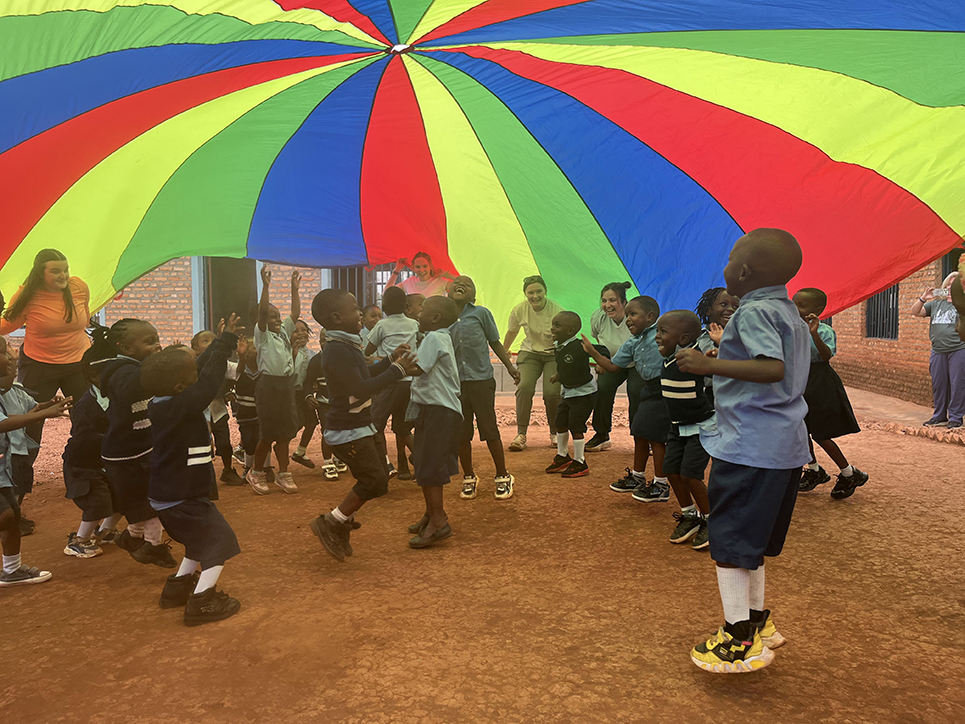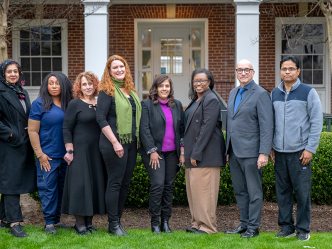Nursing and occupational therapy students explored interdisciplinary health care in Rwanda, where they made a generational impact on the communities as they demonstrated excellence with flexibility, rapport and professionalism.
The students sat on the floor with Rwandans, learning and teaching collaboratively while washing hands and feet as they taught skin care and sanitation. They learned traditional dances, were enthralled on an authentic African safari and ate fruit hand-picked from local gardens.
Through the networking of Ryan Carrick, PhD, over the past 12 years, he and Carol Hunter, DNP, took 16 students from Augusta University’s College of Allied Health Sciences and the College of Nursing and embarked on a 13-day study abroad fieldwork experience in March.
Carrick and Hunter each created a course to prepare their students for the experience. Hunter, who has led study abroad programs for CON since 2014, and Carrick worked with students to plan activities that fostered interprofessional collaboration as they participated in health teaching and other activities with rural Rwandans.
“The purpose of the trip was for the students to listen and learn from a different culture, then teach how to improve overall health as individuals and families,” Carrick said. “Our students were able to learn how to work together in an interdisciplinary way. This education provided a unique opportunity for these students to have a greater understanding of what it could be like to work as a team when they graduate. These students now have this memorable experience under their belts of collaborating while quickly thinking on their feet from past learning and individual skill sets, so the audience could understand the material at a greater depth.”

Preparing for the trip
The group spent most of their time in Gahara, a remote village in the Rwandan hills, and Myumbu, a community on the outskirts of Kigali, the capital city of Rwanda.
The five first-year graduate-level occupational therapy students and 11 senior-level registered nurse students were tasked with reading articles about the country, its culture and common diseases and health concerns. They engaged in online and in-person discussions about what they had discovered, all of which led to their planned health-related education in Rwanda.
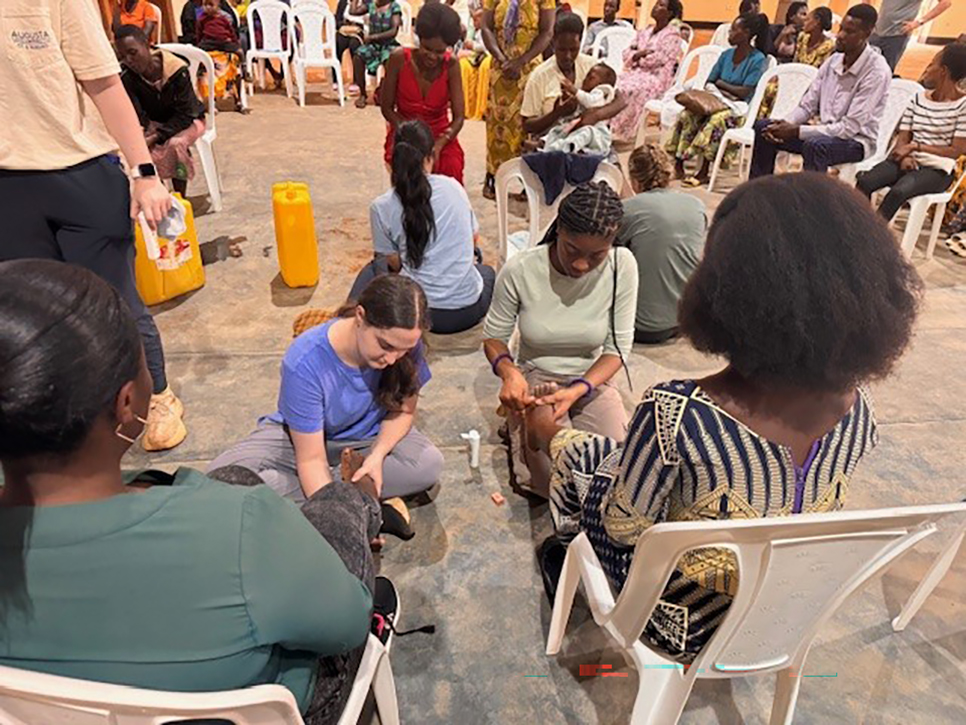
Carrick and Hunter wanted the students to also understand the vast difference between the cultures in the United States and Rwanda. As a team, they watched Hotel Rwanda to provide some context for the genocide that occurred in 1994, where nearly a million people were killed.
“It’s important for our students to understand that from a cultural standpoint so that they have greater sensitivity upon arrival,” said Carrick, who noted they visited two memorials about the genocide during their first day in the country.
Hunter said Africa was an incredible opportunity for students to expand their view of the world and to grow both personally and professionally. She mentioned the students were able to support each other in their professional roles and activities, and layered within the experience was learning about the cultural aspects of the setting – language, customs and the need to improvise – the students problem-solved in creative ways.
“Unique to this trip was the opportunity for students to teach both small groups and larger audiences from a very different culture with a different language (Kinyarwanda),” Hunter said. “Students learned and practiced delivering health information with a translator. Using a translator and working in conditions that often changed and/or were very different from what we are accustomed to, the students quickly adapted. These skills will be very useful in their future as health care professionals.”
Embracing the experience
For Sabrina Rodgers, an OT student, the trip was her first study abroad experience. She was looking forward to learning about their culture, as well as learning about the similarities and differences with how the locals express themselves religiously and spiritually.
She was amazed at the community involvement Rwandans have for one another, especially when it came to taking care of children. Despite the amount of advanced research, there were still uncertainties regarding what the group would encounter. She walked away proud of the impact they had on the community.
“We were very unsure about how many people we would have, and we ended up having more than 100 kids and 100 adults. We adapted our activities to fit the big group, and I think how we ended up doing it went smoother,” said Rodgers, who oversaw deep breathing exercises intended for regulating emotions or managing stress.
“The thing that impressed me the most was how willing everybody was to listen to us,” she added. “We went into it not knowing how many people we would have, and then everybody showed up. They were so attentive, asking questions and participating in our activities more than we expected. That was a good outcome for us.”
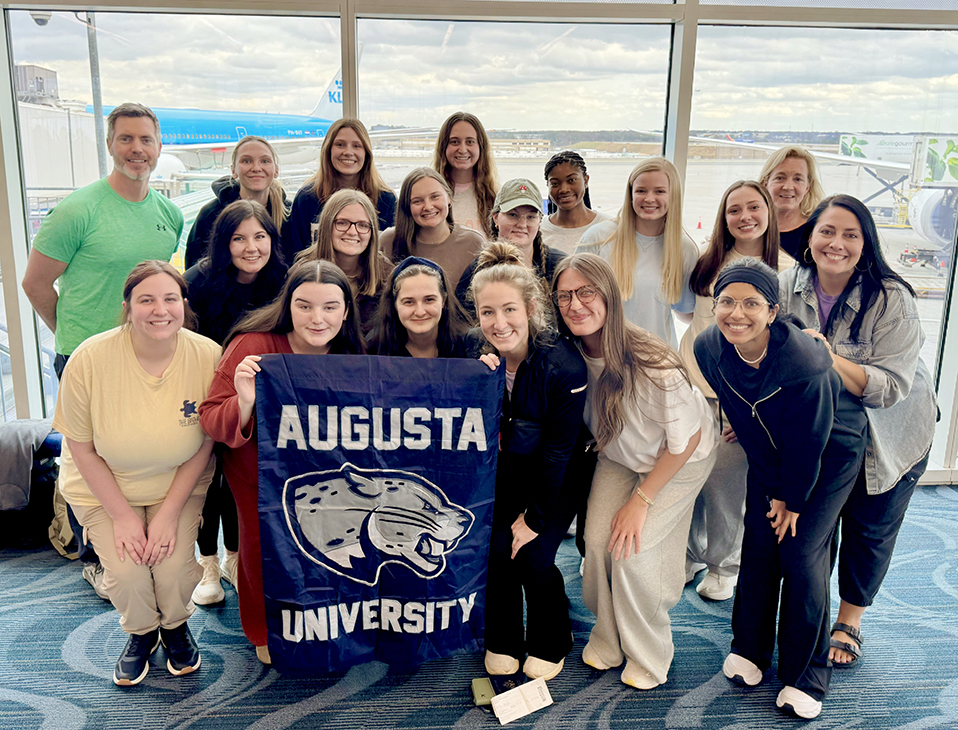

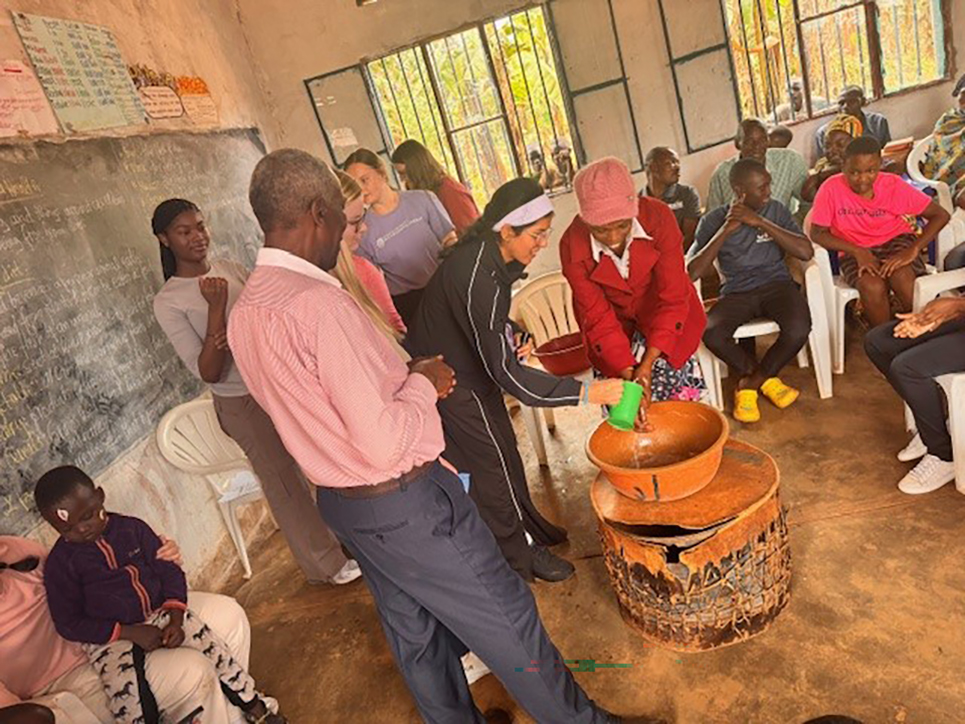

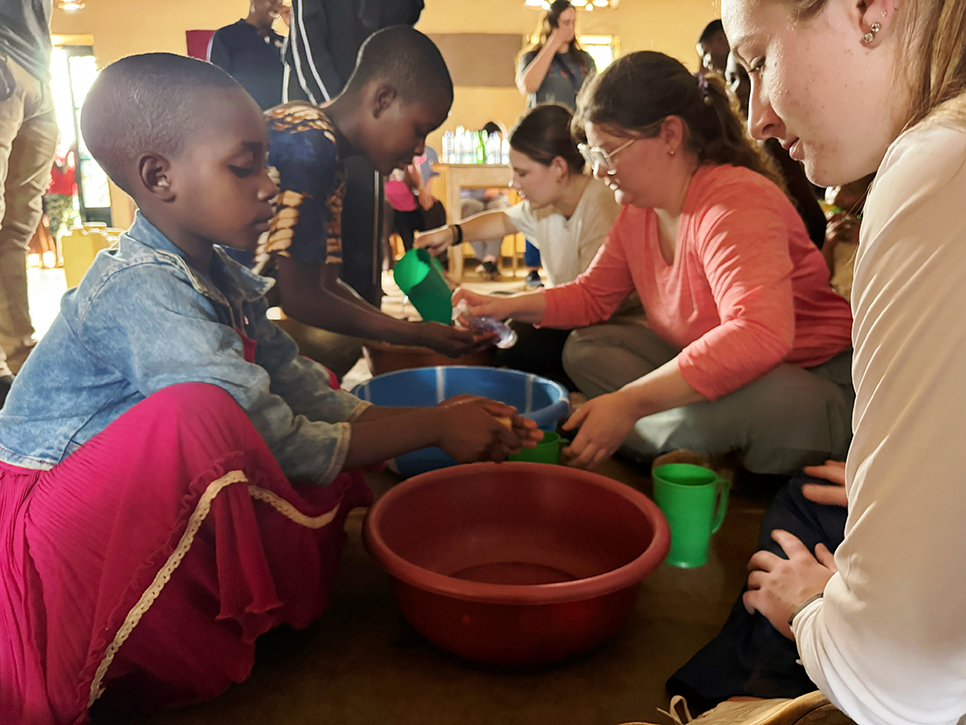
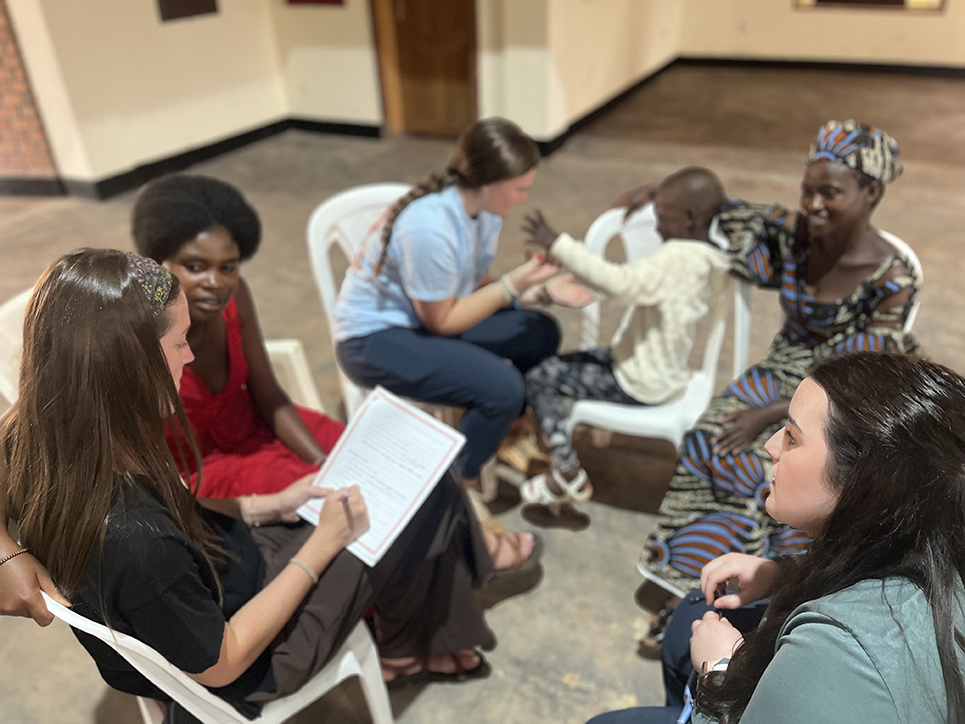


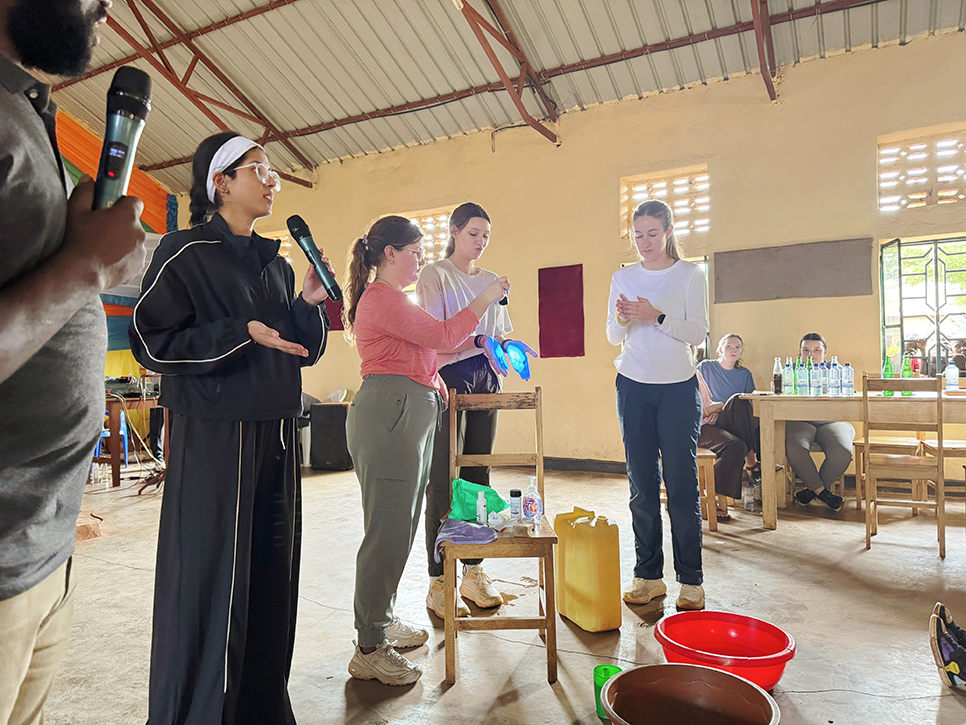


Nursing student Lauren Evens had never studied abroad either but said the things she saw in Rwanda were a “completely new experience.” Entering the trip, she was intrigued by the option of broadening her knowledge about different cultures.
“All my life, I feel like I’ve been in a little bubble, and there’s so much more to see and learn,” she said. “When they first brought up the opportunity, I wanted to go. I needed to see more than I’ve seen in Georgia or the Southeast. This was a perfect opportunity for me.”
Most of the nursing prep work focused on what the Rwandan health care system was like, what they do for recreation, what they would eat and what transportation is like. Evens said a lot of their research centered around sanitation, stroke and stroke education, as well as reproductive education.
She was surprised at how welcoming the Rwandans were and noted the village children had smiles on their faces and were thankful for them being there.
“As soon as we got out of the airport, there were people to pick us up. People waved and gave us big hugs, which is not something I’m used to in America because when I wave, half the time people tend to not wave back,” she said. “It was awesome to see, heartwarming and just very welcoming.”
Educational moments
Carrick said trips like the one to Rwanda provide plenty of opportunities for high-impact education for everyone. For instance, he noted that overpopulation in Rwanda may be a root cause of neglect for children with disabilities, impairments or developmental delays.
Through AU’s interdisciplinary education of the reproductive system, use of contraceptives, fertility cycles with the adults and pediatric assessment and education with the children, the students were able to develop a rapport, meeting needs at both a tangible health care level and a societal, cultural level. They also built community resources, created caregiver networks and empowered single mothers, couples and siblings to know that all people should have opportunities, and all have abilities to celebrate.
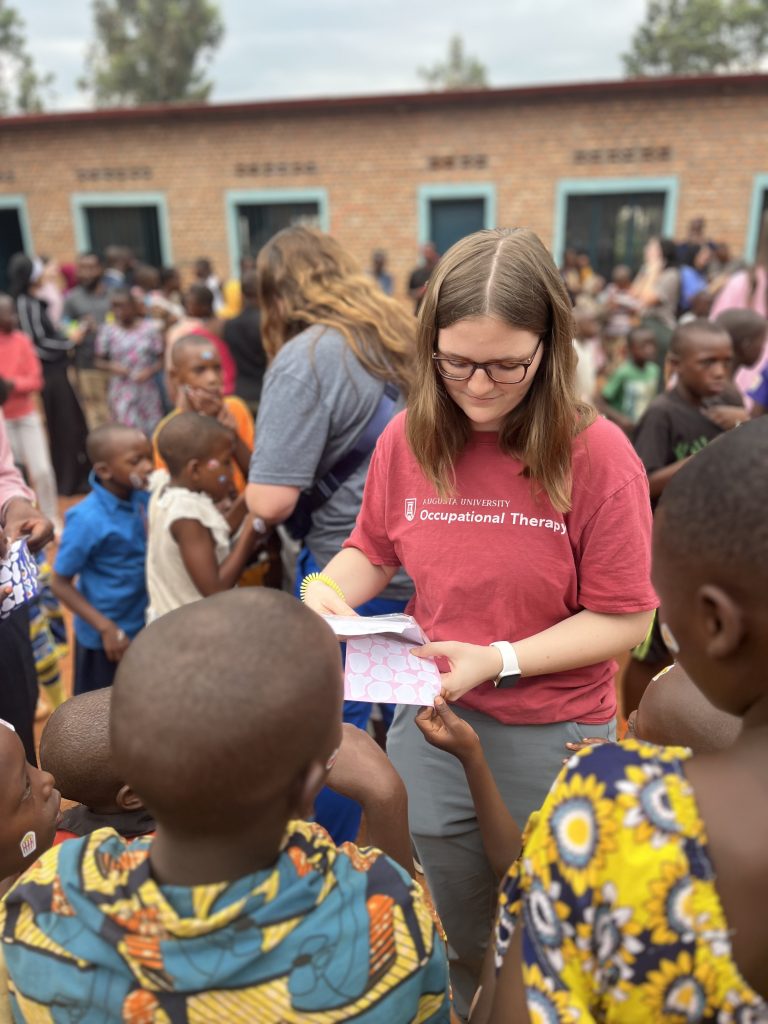
“As an example of the generational and societal difference our students made, an older man in one of the rural villages stood up after an hour of our students’ teaching and said, ‘What these people are saying is good. We have not considered this perspective, and we need to change. Please listen to what they are telling us,’” Carrick said. “While this wonderful and bold statement was made in the midst of reproductive teaching, he was also referencing the AU students’ teaching on skin care, stroke education, nutrition, sanitation, exercise and emotional regulation.”
Hunter has traveled often with students and has come to expect just about anything. She said they have learned to adapt, respond and adjust as needed. She wasn’t prepared for how gracious the people they worked with and met were.
“From our translators to the villagers to our safari guides – exceptional people – I was reminded, once again, that regardless of who we are or what our circumstances may be, we share the same humanity and so often the same deepest desires despite our apparent differences,” Hunter said.
Rodgers and Evens both said the trip was a worthwhile experience. Evens said she would “100% jump on the opportunity” to go somewhere again, and Rodgers suggested learning as much about the country as possible and talking to others that have traveled for advice.
“The study abroad trip to Rwanda was an opportunity for occupational therapy and nursing students to expand their clinical skills but also immerse themselves in a rich cultural experience,” said CAHS Dean Lester Pretlow, PhD. “Through interprofessional collaboration, nursing and OT students worked cohesively to deliver holistic health care. This journey fostered a global perspective of health, deepened empathy and inspired a commitment to health care excellence across borders.”
 Augusta University
Augusta University
